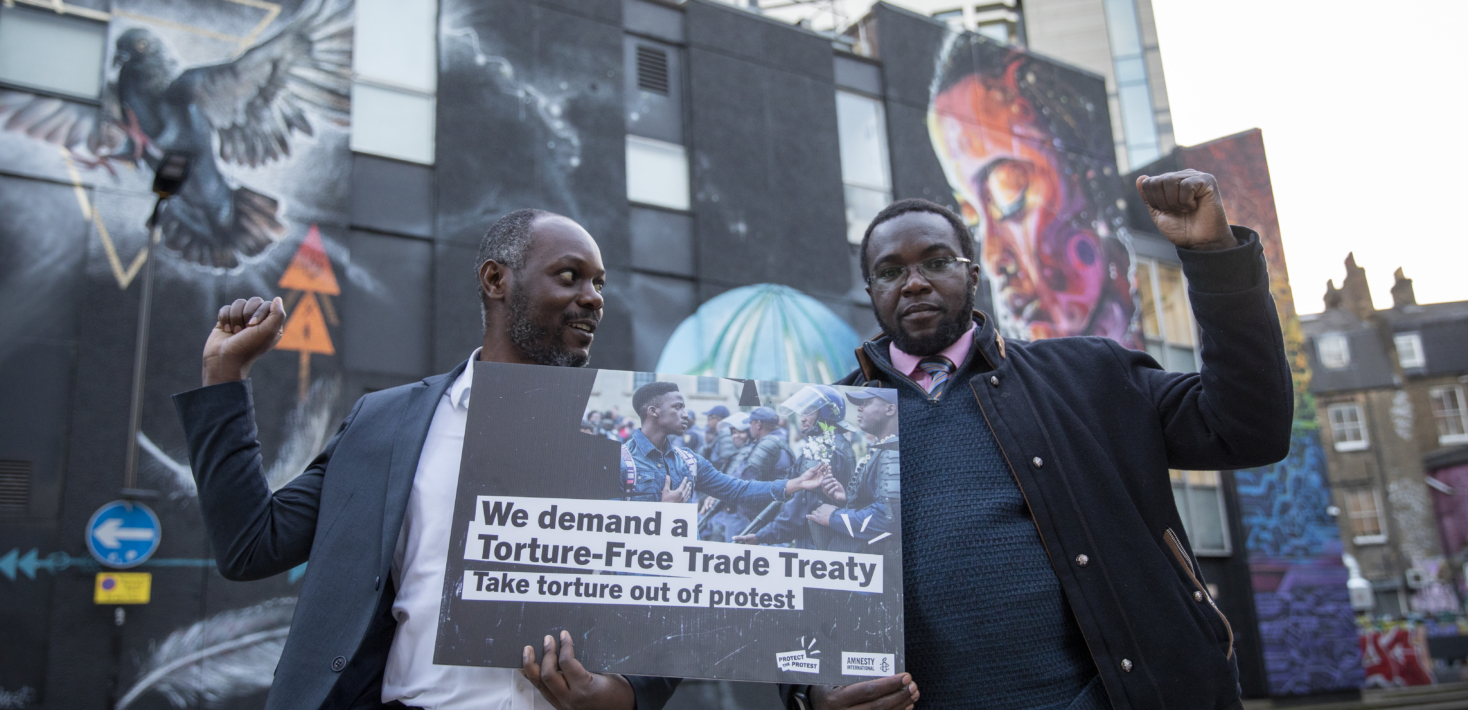On 31 July, the European Union (EU) extended the scope of goods covered by its pioneering Anti-Torture Regulation, strengthening its region-wide measures preventing the transfer of law enforcement equipment to those who would use it for torture and other ill-treatment worldwide. Amnesty International calls for EU member states to fully implement these important changes and urges governments worldwide to redouble policy and practical work to counter the trade in tools of torture and to effectively prevent torture and other ill-treatment across the globe.
These most recent additions to the Regulation represent a crucial advance in the prevention of torture and other cruel, inhuman or degrading treatment or punishment. They include new prohibitions on hoods and blindfolds, leg irons, gang chains, lathis (long flexible bamboo sticks used as batons), sjamboks (heavy whips), weighted gloves and weighted batons; and controls on the trade in kinetic impact projectiles – such as rubber or plastic bullets – and related launchers, malodorants – chemicals that have a deeply unpleasant smell which have been used against protesters – and leg cuffs – restraints connected by a chain which fasten a detainee’s ankles together.
These changes reflect the fact that torture and other ill-treatment happens both in places of detention and in the street – particularly in the context of state repression of protesters. Amnesty International has documented severe injuries, such as the loss of eyes, and even deaths resulting from state authorities’ misuse of law enforcement equipment against people exercising their right to freedom of peaceful assembly.
If fully implemented by EU member states in practice, this expansion of the Regulation’s reach can strengthen the EU’s work on the prevention of torture and other ill-treatment, helping to prevent abuses and protect people across the world, in particular protesters, human rights defenders and detainees.
Yet the scope of goods covered by the EU Anti-Torture Regulation could be improved still further. Amnesty International, along with the United Nations (UN) Special Rapporteur on Torture and other cruel, inhuman or degrading treatment or punishment and a range of civil society organisations, has long argued that ammunition containing multiple kinetic impact projectiles and multiple barrel launchers are inherently inaccurate, inhumane and unsafe and should therefore be prohibited.
Amnesty International also calls for other inherently inhumane weapons – such as direct contact electric shock devices – to be moved to the prohibited list in future revisions. Recent research has revealed the severe pain, suffering and degradation that equipment such as electric shock batons and stun guns has inflicted on detainees and protesters worldwide.
Positive changes to the EU’s Anti-Torture Regulation can act as an entry point for further, more ambitious regional and global regulations in this important area of work. The EU has an opportunity to be a force for good internationally as a co-chair of the Alliance for Torture-Free Trade and at the United Nations, where there is the potential to create strong and legally-binding international regulations on the global trade in equipment that can be used in torture and other ill-treatment.
Background
In force since 2006, the EU Anti-Torture Regulation is the only legally binding multilateral law regulating the trade in goods that can be used for torture, other ill-treatment and the death penalty. The law was substantially strengthened in 2019. The current broadening in the scope of prohibited and controlled lists brings the EU regulation more closely in line with the recommendations in the UN Special Rapporteur on Torture’s 2023 thematic report on torture-free trade.
The EU Anti-Torture Regulation has stimulated interest in the introduction of similar measures at the regional and global levels. These important steps by the EU coincide with positive momentum within the Council of Europe, where the Steering Committee for Human Rights (CDDH) has recently adopted its report on implementing Recommendation CM/Rec(2021)2 on measures against the trade in goods used for the death penalty, torture and other cruel, inhuman or degrading treatment or punishment.
The EU was a driving force behind the creation of the Alliance for Torture-Free Trade at the margins of the United Nations General Assembly in September 2017. In January 2023, a network of over 30 NGOs working on torture prevention and police violence issued the Shoreditch Declaration, calling for “the strongest possible global treaty to put an end to the torture trade”. Since then, the network has grown to over 80 NGOs from all regions of the world working together to encourage states to negotiate a Torture-Free Trade Treaty.


